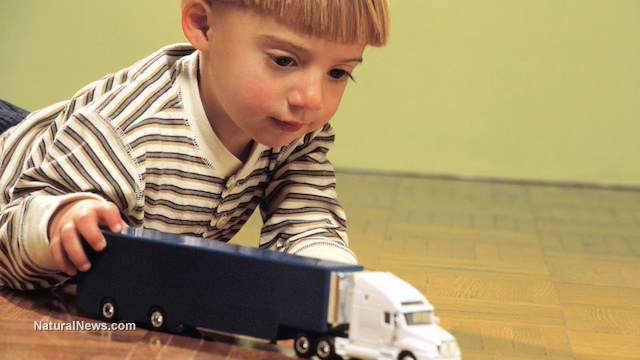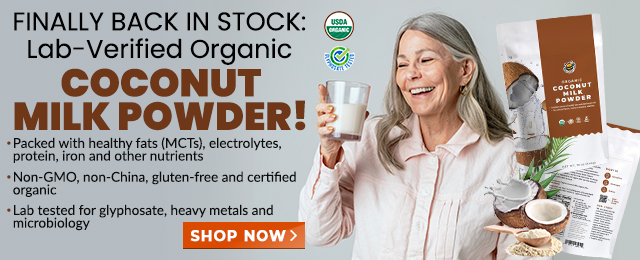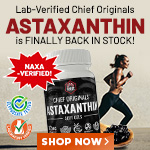Antibiotics improve autistic child's symptoms, validating the autism-gut microbe connection
Saturday, May 23, 2015 by: David Gutierrez, staff writer
Tags: autism, gut microbiome, antibiotics

- European Court of Justice: Healthcare professionals who promoted or administered COVID-19 vaccines are CRIMINALLY LIABLE for any harm caused
- “Old Man in a Chair”: The COVID-19 pandemic was a carefully orchestrated scheme for global control
- Cinnamon plays a critical role in diabetes management
- Scientists unveil breakthrough method to eliminate "Forever Chemicals" from water, transforming waste into graphene
- FRAUD ALERT: Details DEMOCRATS do NOT want you to know about the $40 BILLION wasted on Fed-loaded credit cards cancelled by DOGE
- Newly released JFK files reveal Pentagon's role in creating Lyme disease and covid in the same lab
- Postcard from 1875 highlights smallpox vaccine’s failure: Lessons for today’s COVID-19 response
- Massive egg substitution recall: Bleach contamination sparks nationwide concern
- DOGE finds evidence of Social Security fraud and illegal immigrant voter registration
- AI-powered forecasting model proves more accurate than traditional systems at predicting the weather
- Zelensky defies Trump, rejects U.S. aid repayment and mineral deal amid rising tensions
- Oncologist warns of ‘terrifyingly aggressive’ cancers in children, linked to immune suppression from COVID vaccines
- Preparing for the unthinkable with William Brocius’ “How to Survive the Death of the Dollar”
- World Health Organization in crisis, prepares for DOWNSIZING after U.S. withdrawal and funding problems
- Trump administration deploys spy satellites to enhance southern border surveillance
- Pentagon memo suggests U.S. will not defend Europe from Russian aggression, prioritizing China and homeland security
- Science proves PASSION FRUIT is a powerful medicine for the GUT and the HEART
- Israel's war on Gaza's healthcare: Over 1,400 medical workers killed in attacks
- Newly released JFK files reveal Pentagon's role in creating Lyme disease and covid in the same lab
- Kiss Your Genetic Privacy Good-Bye! 23andMe Gets Green Light to Sell Your Intimate Genetic Details to Anyone They Want
- Oncologist warns of ‘terrifyingly aggressive’ cancers in children, linked to immune suppression from COVID vaccines
- Analysis: The coming economic collapse, a mass uprising and Trump's three secret weapons to halt the growing revolt
- European Court of Justice: Healthcare professionals who promoted or administered COVID-19 vaccines are CRIMINALLY LIABLE for any harm caused
- Dr. Suzanne Humphries makes bombshell appearance on Joe Rogan podcast, exposing vaccine industry deception back to POLIOMYELITIS
- Woman contracts WORLD'S DEADLIEST VIRUS after unknowingly being given the WRONG VACCINE
- NIH study, buried for decades, reveals that Flu Shots INCREASE elderly deaths, not prevent them
- Sugar-free deception: Artificial sweeteners hijack hunger signals, fuel obesity epidemic, study warns
- CDC finally halts $11 billion COVID funding scam as health officials admit the ‘pandemic’ was a fraud
- AI weather model outperforms traditional forecasts, boosts accuracy by 20%
- Black cumin seed oil emerges as a powerful ally against breast cancer and chronic inflammation
- Musk targets “strangely wealthy” lawmakers in DOGE probe, names Pelosi, McConnell, Schumer
- COVID-19 scandal linked to CANCER SURGE: Billionaire researcher sounds alarm
- “Independent” anti-Russia outlet MEDUZA faces COLLAPSE as US funding dries up
- The Health Ranger releases “Vaccine Zombie” song and music video, using AI-animated zombies for the music video
- DARPA: The shadowy innovator behind the world’s most advanced military technologies
- Britain’s descent into police state censorship: Parents raided for questioning their daughter’s school system online
- Newly released JFK files reveal Pentagon's role in creating Lyme disease and covid in the same lab
- California's social media censorship law struck down: A victory for free speech or a threat to online safety?
- EPA advisor admits the agency is funneling billions to climate groups ahead of Trump’s return to White House
- The Health Ranger releases “Vaccine Zombie” song and music video, using AI-animated zombies for the music video
- Dr. Mike Yeadon releases 15-minute testimony - WATCH - about genocidal intent of COVID “vaccines”
- Florida takes a stand: DeSantis proposes permanent ban on mRNA vaccine mandates
- Mike Adams releases country western hit single: Goin’ Back in Time is Comin’ Home
- Rep. Nancy Mace introduces bill to ban biological males from female facilities on federal property
- Unpacking the Lies That We’ve Been Fed – new song and music video released by Mike Adams, the Health Ranger
- “Why we influenced the 2020 elections”: Facebook files reveal the coordinated effort to bury the Hunter Biden laptop story
- House Intelligence Committee calls for the ARREST and PROSECUTION of Dr. Anthony Fauci
- Sugarcane extract superior to cholesterol-lowering drugs?
- The pandemic as a tool for INDOCTRINATION: Understanding “The Indoctrinated Brain” by Dr. Michael Nehls
- Survival 101: Effective EMF blocking techniques
- Mike Adams releases music poetry sensation: A Child of God
- Peter Rost exposes Big Pharma corruption in his book “The Whistleblower: Confessions of a Healthcare Hitman”
- Migrants are taking advantage of recent hurricanes to scam residents and loot their homes
- Michigan sheriff announces criminal investigation into 2020 election crimes, Dominion Voting Systems
- Red Cross issues warning to stop blood plasma donations from vaccinated people
- Scientists confirm: GENIUS brain function can be spontaneously unleashed in humans without any apparent cause
- EPA advisor admits the agency is funneling billions to climate groups ahead of Trump’s return to White House
- HYSSOP: What research reveals about the health benefits of this ancient holy herb
- Two containers with completed ballots fall out of truck in Florida
- Fully vaccinated about to see “tsunami” of illness and death, warns virologist
- Global leaders unite to clamp down on “misinformation” with UN-backed Cascais Declaration
- BREAKING: 2025 NDAA authorizes mandatory military draft of WOMEN across America… as Pentagon pursues global NUCLEAR war with both Russia and China at the same time
- Michael Yon warns of a ZIONIST TAKEOVER in Trump’s second administration
- Ozempic and Wegovy weight loss drugs are injectable LIZARD VENOM PEPTIDES that may unleash a devastating wave of organ failure… side effects align with symptoms of SNAKE BITES
- BOMBSHELL: DNA testing kits are a SCAM to develop ethnic-specific bioweapons
- Israeli soldiers accused of even more torture and abuse in the West Bank
- These 13 countries just signed an agreement to engineer a global FAMINE by destroying food supply
- NASA admits that climate change occurs because of changes in Earth’s solar orbit, and NOT because of SUVs and fossil fuels
- Newly released JFK files reveal Pentagon's role in creating Lyme disease and covid in the same lab
- RFK Jr. clears key hurdle: Sen. Susan Collins backs controversial HHS nominee, signaling a new era for health policy
- Sermon 30: How Jesus reveals Caesar’s FAKE CURRENCY and FALSE AUTHORITY
- Coriander seeds: Ancient medicine backed by modern science
Roughly 100 trillion microorganisms live in the human gut, playing a critical role in regulating everything from digestion to immune function and even mood. Now, evidence continues to mount that there might be some connection between an abnormal composition of these microorganisms (collectively known as microbiota, or the microbiome) and autism.
Scientists start listening to parents
In his article, Rodakis wrote that, when he noticed the striking improvement in his son's autism, he began taking comprehensive notes on his son's symptoms. He actually developed customized software which allowed him to track 20 separate autism parameters using quantitative measurements while he made qualitative notes (Rodakis also has a background in molecular biology, as well as a Harvard MBA). Rodakis notes that, at the same time, his son's therapists, who did not know about the antibiotics, independently commented that his son had improved.After this experience, Rodakis conducted a literature review in search of research on a connection between autism and antibiotics but found only a single article. That article told of a 1999 study at Chicago Rush Children's hospital and also reported improvement in autistic children on antibiotics. Rodakis then discovered similar and widespread experiences among other autistic parents.
"I was determined to understand what was happening in the hope of helping both my son and millions of other children with autism," he wrote.
Rodakis discovered that the 1999 study had been inspired by a then-fringe hypothesis that the microbiome might play a role in autism, but even as of a few years ago little research had attempted to test the hypothesis. So Rodakis approached leading autism researcher Richard Frye, who heads the Autism Research Program at Arkansas Children's Hospital Research Institute.
"Careful parental observations can be crucial," Dr. Frye said. "In science we take these observations, put them through the scientific method, and see what we find. This is what can lead to ground breaking scientific discoveries and breakthroughs in the field."
The collaboration they founded eventually attracted researchers from around the world and recently culminated in the First International Symposium on the Microbiome in Health and Disease with a Special Focus on Autism, held in June 2013. The special issue of Microbial Ecology in Health and Disease contains contributions from presenters at that conference, as well as other scientists.
From the margin to the center
The connection between autism and the microbiome is no longer fringe, or speculative. Numerous studies have now confirmed that autistic children have a different composition of microbiota than non-autistic children. But the field is still under-funded, Rodakis notes."At the time of his diagnosis, we had been led to believe that our son's autism was a hard-wired neurological condition from which he would not emerge," he wrote, "but during the fall and winter of 2012 and subsequent periods since then we have seen our son with the veil of autism partially lifted.
"I love him unconditionally regardless of his autism or how he is doing on any given day, but because I have seen what is possible, I will endeavor to promote research that benefits all children with autism and to remove all impediments from him becoming the fullest embodiment of who he can be and until it is definitively proven otherwise, I will strive to foster research consistent with the evidence of the microbiome's involvement in autism."
Sources:
http://www.natureworldreport.com
http://www.techtimes.com
http://www.newswise.com
http://www.naturalnews.com
http://www.newswise.com
http://www.nature.com
http://truthwiki.org/Medical_Fascism
Autism at FETCH.news
Get independent news alerts on natural cures, food lab tests, cannabis medicine, science, robotics, drones, privacy and more.
Take Action: Support Natural News by linking to this article from your website
Permalink to this article:
Embed article link: (copy HTML code below):
Reprinting this article:
Non-commercial use OK, cite NaturalNews.com with clickable link.
Follow Natural News on Facebook, Twitter, Google Plus, and Pinterest
Science News & Studies
Medicine News and Information
Food News & Studies
Health News & Studies
Herbs News & Information
Pollution News & Studies
Cancer News & Studies
Climate News & Studies
Survival News & Information
Gear News & Information
News covering technology, stocks, hackers, and more



"Big Tech and mainstream media are constantly trying to silence the independent voices that dare to bring you the truth about toxic food ingredients, dangerous medications and the failed, fraudulent science of the profit-driven medical establishment.
Email is one of the best ways to make sure you stay informed, without the censorship of the tech giants (Google, Apple, Facebook, Twitter, YouTube, etc.). Stay informed and you'll even likely learn information that may help save your own life."
–The Health Ranger, Mike Adams













































